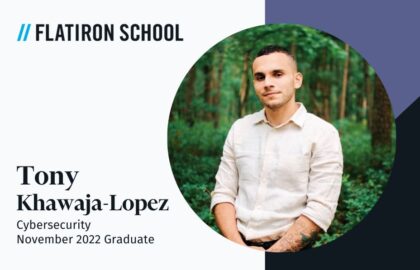Great Companies Hire Our Grads
Career Paths
The demand for Cybersecurity professionals is growing rapidly. In fact, The Bureau of Labor & Statistics indicate a 35% national growth for Security Analysts, which is much faster than the average of all occupations. Here are some in-demand jobs you could land:
Cyber Engineer
Average Salary: $116,497*Cyber Engineers, sometimes called Information Security Engineers, identify threats and vulnerabilities, then apply their skills to developing and implementing high-tech solutions to defend against hacking, malware and ransomware, insider threats and all types of cybercrime.
*ZipRecruiter (September 2023)
Security Analyst
Average Salary: $111,141*Security Analysts are responsible for ensuring that the company’s digital assets are protected from unauthorized access. This includes securing both online and on-premise infrastructures, weeding through data to filter out suspicious activity, and mitigating risks.
*ZipRecruiter (September 2023)
Penetration Tester
Average Salary: $118,358*Penetration Testers help organizations identify and resolve security vulnerabilities affecting their digital assets and computer networks. They try to break things by simulating a cyber attack and attempting to breach networks and information systems.
*ZipRecruiter (September 2023)
Security Consultant
Average Salary: $116,514*A Security Consultant works as a supervisor for all security measures necessary to effectively protect a company or client’s assets. Security Consultants use their expertise to assess possible security threats and create contingency protocols and plans for when violations occur.
*ZipRecruiter (September 2023)
Hear From Our Grads
Student Stories
Each of these students pursued Cybersecurity at Flatiron School.






Curriculum
Industry-approved curriculum to support your journey into Cybersecurity.
Introduction to Cybersecurity
In this introduction to cybersecurity course, you’ll learn about computer hardware, basic networking, and virtualization software. You’ll explore computer components like the CPU, RAM, and storage, and gain hands-on experience with the Linux command line. The final assessment involves finding flags on Windows and Linux virtual machines, providing a foundational understanding necessary for securing IT systems against cyber attacks.
What you’ll learn:
- Identify components of computer hardware
- Identify command Linux commands
- Identify built in security features of Windows and Linux
- Configure virtual machines
Introduction to Python
This introductory Python course equips you with essential programming skills for cybersecurity. You’ll learn scripting basics, compiled vs. interpreted languages, algorithms, and data structures. The course also covers Python libraries and functions. It concludes with a project where you’ll develop a Python script to analyze data, preparing you to use Python effectively in real-world cybersecurity challenges.
What you’ll learn:
- Apply the basics of programming language methodologies to real-world scenarios
- Demonstrate foundational skills for scripting with a programming language, python
Operating Systems and Networking
This course teaches you to secure computer networks and systems, covering Linux and Windows operating systems, computer networking, and troubleshooting techniques. The final assessment involves analyzing a network diagram and virtual machines to troubleshoot connectivity issues.
What you’ll learn:
- Demonstrate fundamental knowledge of computer networking diagrams
- Determine potential computer networking and operating system issues in cybersecurity scenarios
System Hardening
This course enhances your Linux skills with advanced commands and techniques, covers Active Directory security, common threats, and mitigation strategies. It includes cloud computing fundamentals, data protection methods, encryption, and privacy regulations. You’ll also learn system hardening, scripting for automation, and monitoring system health for optimal security.
What you’ll learn:
- Identify mitigation strategies to protect against future attacks.
- Implement knowledge of system hardening to a scenario.
Threat Intelligence
This comprehensive cyber threat intelligence course covers the fundamentals of CTI and its role in cybersecurity. You’ll explore real-world applications, threat intelligence models like MITRE ATT&CK, and analyze security incidents. The course also emphasizes the importance of Governance, Risk, and Compliance (GRC) in cybersecurity strategy.
What you’ll learn:
- Outline a response to an attack using security information and event management (SIEM) data.
- Integrating GRC strategies in cybersecurity processes
SIEM and Threat Hunting
This course focuses on security incident detection and response, covering Security Information and Event Management (SIEM) solutions, log analysis, and threat intelligence. You’ll explore advanced SIEM features, threat hunting techniques, and vulnerability management. The course ends with a project where you’ll use SIEM and threat hunting to address a cybersecurity incident.
What you’ll learn:
- Utilize SIEM solutions and threat hunting to solve a cybersecurity incident
- Integrate Security Information and Event Management (SIEM) solutions to solve cybersecurity incidents
Security Architecture and Frameworks
This course covers secure architecture fundamentals, frameworks, and the consequences of insecure design. You’ll learn to assess system vulnerabilities, understand secure network architecture, and explore zero-trust concepts, network segmentation, and cloud security. The course concludes with a project where you’ll identify vulnerabilities using your knowledge of IT architecture and security.
What you’ll learn:
- Integrate knowledge of security architecture to identify vulnerabilities that are discovered.
- Identify mitigation strategies to protect against future attacks.
Incidence Response
This course covers digital forensics, including malware recognition and evaluation, Python skills for API security, and memory forensics for Windows and Linux. It concludes with a project where you’ll use these skills to respond to a cybersecurity incident.
What you’ll learn:
- Identify mitigation strategies to protect against future attacks.
- Conduct an investigation to an incident using best practices of digital forensics and incident response
- Implement best practices for API security for organization security.
Penetration Testing
This comprehensive course teaches you to ethically exploit vulnerabilities and identify security weaknesses. You’ll learn social engineering, reconnaissance, scanning, enumeration, and post-exploitation strategies. Gain hands-on experience with tools like Burp Suite and Metasploit, and apply your skills in a real-world penetration testing project.
What you’ll learn:
- Develop and log corrective action methodology to a system vulnerability using industry standard techniques.
- Implement knowledge of nmap for penetration testing.
Penetration Testing Applications
This course covers web application security, including common threats, secure coding, and penetration testing with industry tools. You’ll master Active Directory attack methods, mitigation strategies, and credential dumping, and learn OT security best practices and emerging trends like AI and quantum cryptography. It also addresses mobile device security, including vulnerability identification, configuration, and scripting for automated scans. The course concludes with a web application security penetration testing project.
What you’ll learn:
- Develop and log corrective action methodology to a system vulnerability using industry standard techniques.
- Implement a methodology for building secure mobile architecture.
Cybersecurity Capstone
In this intensive course, you’ll work on 3 projects focused on solving business problems. You’ll analyze network diagrams, create an incident response plan, and develop a security assessment, integrating skills from previous courses to produce technical processes and reports.
What you’ll do:
- Analyze a network diagram
- Create an incident response plan
- Develop a security assessment including technical process and report
You’ll receive a certificate of completion upon passing each program. Once you complete all programs — Essentials through Capstone — you’ll be ready to jump head-first into the job search with the help of your dedicated Flatiron School career coach.
A Supported Journey, From Start To Finish
From day one you’ll have access to our student services team — there to answer any questions you have about courses or the enrollment process. Our only mission is to help you achieve life-changing results through our programs. We’re dedicated to your educational success, and you’ll never have to do it alone.
Your Life Won’t Wait For A Career Change
Our programs offer maximum flexibility to fit education into your life – not the other way around.
Full-Time
You’re ready to commit to a full-time course load. You’ll graduate in 15 weeks thanks to a rigorous schedule.
- 15 weeks
- 100% online
- Learn along with your cohort
- Course highlights:
- Learn from industry experts with real-world experience
- Project-based learning
- Optional weekly sessions with your facilitator
- Discord with classmates and other Flatiron students
Part-Time
Our part-time course is designed for busy people. If you don’t have 8 hours to dedicate a day, then part-time is for you.
- 45 weeks
- 100% online
- Flexible learning at your own pace
- Course highlights:
- Learn from industry experts with real-world experience
- Project-based learning
- Optional weekly sessions with your facilitator
- Discord with classmates and other Flatiron students
Upcoming Course Start Dates
| Start Date | Pace | Location | Discipline | Status |
|---|---|---|---|---|
|
June 2, 2025
Jun 2, 2025
|
Full-Time | Online | Cybersecurity | Few Spots Left! |
|
June 2, 2025
Jun 2, 2025
|
Part-Time | Online | Cybersecurity | Few Spots Left! |
|
July 7, 2025
Jul 7, 2025
|
Full-Time | Online | Artificial Intelligence | Open |
|
July 7, 2025
Jul 7, 2025
|
Part-Time | Online | Artificial Intelligence | Open |
|
August 4, 2025
Aug 4, 2025
|
Full-Time | Online | Artificial Intelligence | Open |
|
August 4, 2025
Aug 4, 2025
|
Part-Time | Online | Artificial Intelligence | Open |

Tuition
Whether you are learning full-time or part-time, our programs are the same price.
$17,500As low as $12,900
We have 3 easy ways to pay:
- Pay up front & in full
- Pay with a traditional loan
- Pay with a payment plan
*Apply by March 28, 2025 to be eligible for the April 7, 2025 cohort. Total price is dependent on the financing option chosen. Not available for Georgia residents.
From The Blog
Frequently Asked Questions
We don’t require you to have any prior experience! In fact, this program is designed for complete beginners. Our admissions requirements are being at least 18 years old, having a high school diploma, a GED or equivalent credential, having a native or highly proficient fluency in English, and completing the admissions process.
Full-time programs are 15 weeks long, and you’ll be logged on and learning remotely full-time. Part-time programs are 45 weeks long and offer the most flexibility day to day. Both pacings are held entirely remotely and include optional weekly sessions with your program’s facilitator.
If you would like to connect with a member of our team, please simply schedule a chat with one of our Admissions representatives.




